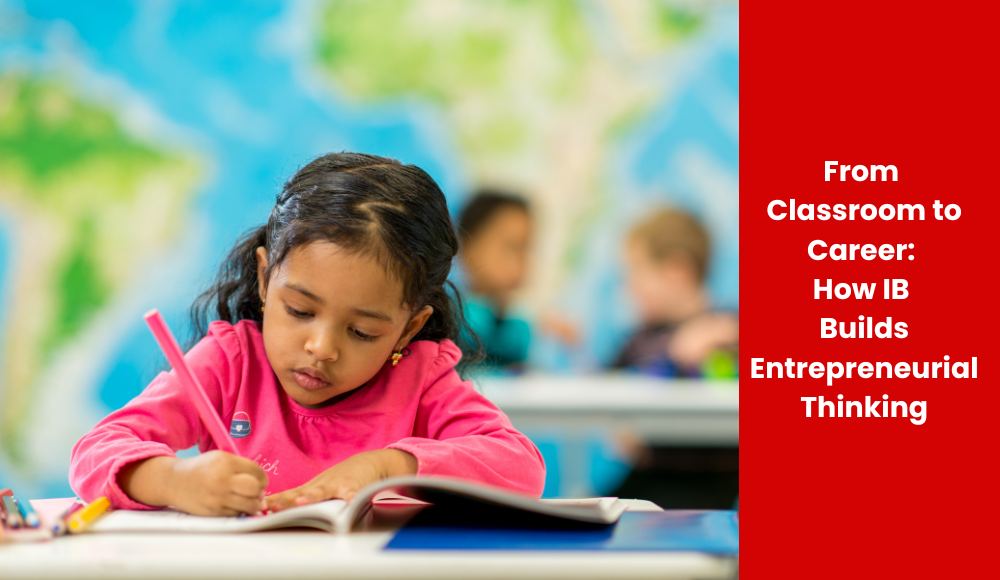From Classroom to Career: How IB Builds Entrepreneurial Thinking
In today’s rapidly evolving world, entrepreneurship has become a key driver of economic growth and innovation. As industries shift towards more dynamic and creative business models, the need for individuals who are not only academically proficient but also innovative thinkers has never been greater. One educational program that stands out in fostering such entrepreneurial skills is the International Baccalaureate (IB) curriculum.
The IB curriculum, known for its rigorous academic standards and holistic approach, plays a pivotal role in nurturing the entrepreneurial mindset from the classroom to career. Here’s how the IB framework equips students with the skills and mindset necessary for entrepreneurial success.
Developing Critical Thinking and Problem-Solving Skills
At the heart of entrepreneurship lies the ability to think critically, identify problems, and develop innovative solutions. The IB curriculum fosters these skills through its inquiry-based approach to learning. Students are encouraged to ask questions, explore diverse perspectives, and analyze complex issues.
For example, in the IB’s Theory of Knowledge (TOK) course, students examine the nature of knowledge itself, exploring how it can be applied across different disciplines. This emphasis on critical thinking enables IB students to approach challenges from multiple angles, a skill that is invaluable in entrepreneurial ventures.
Encouraging Creativity and Innovation
Entrepreneurship thrives on creativity and innovation, and the IB program excels in nurturing these qualities. Whether through the creative arts or in subjects like design technology, IB students are given the freedom to experiment, develop prototypes, and solve real-world problems in innovative ways.
For instance, in the Diploma Programme (DP), students often work on projects that allow them to design new products, services, or solutions, promoting practical application of creativity. This process mirrors the early stages of entrepreneurship, where innovation is the foundation for launching new ventures.
Building Leadership and Collaboration Skills
Entrepreneurs need to lead teams, collaborate with others, and communicate effectively. The IB’s emphasis on group work, especially in projects like the Extended Essay and Creativity, Activity, Service (CAS), provides students with the opportunity to hone their leadership and teamwork skills. Through these collaborative experiences, students learn to work towards a common goal, manage diverse opinions, and navigate complex group dynamics—essential skills for any entrepreneur.
Additionally, the IB encourages students to take initiative, which helps cultivate the self-confidence and drive that are critical for entrepreneurial leadership. Whether it’s managing a team for a group project or taking charge of their own learning, IB students are constantly building the kind of leadership qualities that are vital for success in the business world.
Global Awareness and Networking
In an increasingly interconnected world, successful entrepreneurs must understand global markets and cultures. The IB curriculum is uniquely designed to provide students with a global perspective, fostering an understanding of different cultures, economies, and global challenges.
Through the IB’s international outlook, students gain exposure to diverse viewpoints, which can enhance their ability to spot global trends and identify entrepreneurial opportunities across borders. The collaborative nature of the IB also creates a strong network of alumni and professionals across the world, opening doors to potential partnerships, mentorships, and business opportunities in the future.
Financial Literacy and Entrepreneurial Mindset
Entrepreneurial thinking requires a solid understanding of finance, budgeting, and risk management. While the IB does not offer a specific course on entrepreneurship, it integrates aspects of financial literacy throughout various subjects, such as economics, business management, and mathematics.
In the Economics course, for example, students analyze how businesses operate, the role of entrepreneurship in the economy, and the factors that drive innovation. This knowledge equips students with the tools they need to understand market dynamics and make informed decisions—an essential aspect of running a successful business.
Moreover, the emphasis on self-directed learning within the IB encourages students to take ownership of their educational journey. This autonomy fosters an entrepreneurial mindset, where students are not just passive learners but active creators of their own knowledge and future.
The Entrepreneurial Spirit in CAS Projects
The Creativity, Activity, Service (CAS) component of the IB is one of the most powerful tools in building entrepreneurial thinking. CAS allows students to explore their passions, engage with their communities, and create meaningful projects. Many students use CAS as a platform to develop their entrepreneurial ideas—whether by launching small businesses, organizing charity events, or creating community initiatives.
These projects help students understand the real-world impact of entrepreneurship and the steps required to turn an idea into action. The CAS experience teaches students how to manage projects, allocate resources, and evaluate outcomes—key components of the entrepreneurial process.
Encouraging Risk-Taking and Resilience
Entrepreneurs must be willing to take calculated risks and learn from failure. The IB curriculum encourages students to embrace challenges and view setbacks as learning experiences. Through activities such as the Extended Essay and group projects, students are often pushed out of their comfort zones, learning the value of persistence and resilience.
The reflective component of the IB, embedded in both CAS and TOK, encourages students to assess their strengths and weaknesses, helping them develop the resilience necessary for the entrepreneurial journey. The ability to bounce back from failure and persist in the face of obstacles is what separates successful entrepreneurs from the rest.
Conclusion
We at K.R. Mangalam Global School believe that IB curriculum doesn’t just prepare students for university—it prepares them for life as global citizens and entrepreneurs. Through critical thinking, creativity, leadership, and a focus on real-world problem-solving, IB students develop the entrepreneurial mindset necessary to thrive in today’s fast-paced business world. Whether they go on to launch their own startups or become innovators within established companies, the skills and experiences gained through the IB curriculum provide a solid foundation for entrepreneurial success.
By blending academic rigor with practical, hands-on experiences, the IB empowers students to transition seamlessly from the classroom to the career world, where they are equipped not just with knowledge but with the entrepreneurial spirit to make a meaningful impact.

